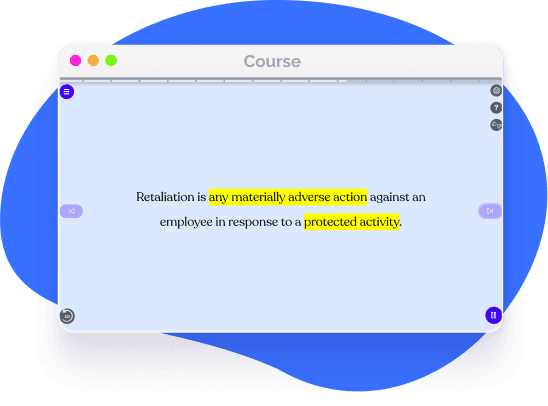Retaliation in the workplace
Retaliation in the workplace is a serious issue that can have significant consequences for employers and employees alike. It occurs when an employee takes action against another employee, or an employer takes action against an employee, for a legally protected activity. This chapter will discuss the various forms of retaliation, how to recognize it, and the steps to take to protect yourself if you think you're the target of retaliation.

Impact of Retaliation in the Workplace
Retaliation at work can be extremely detrimental to both the working environment as a whole and its staff. Employees may believe their jobs and futures are in jeopardy if they speak out against any kind of discrimination or unfair treatment, which can foster a culture of fear and mistrust. Retaliation reduces productivity by making workers disengaged and less driven to produce their best work. Additionally, it may result in expensive legal disputes and reputational harm to the business, both of which can be challenging to repair. In order to prevent and address any instances of workplace retaliation, managers and employers must take action.

Why Retaliation Exists in the workplace
One of the main reasons retaliation exists is to serve as a way for employers to discourage employees from reporting or engaging in behavior that is against company policy or illegal. It's a way to maintain control and power in the workplace. Retaliation can also take the form of punishing employees who file complaints or sue the company. It is a form of intimidation that serves to discourage people from voicing their grievances or taking any action that could potentially be damaging to the employer. Always keep in mind that retaliation is illegal!

Harassment in the workplace can be a difficult and intimidating situation to navigate. It can be difficult to know what to do or who to talk to. Here are some of the benefits of providing retaliation prevention training to your workforce:
Retaliation prevention training can help to reduce the risk of litigation and other legal issues, as employees are better equipped to recognize and respond appropriately to retaliatory behavior. Retaliation training can help to create and enforce clear policies so that employees know what behaviors are considered retaliatory and can take the appropriate steps to address any occurrence of retaliation. Additionally, employers can also have a better understanding of the legal ramifications of retaliation to ensure that any claims are handled appropriately.
By engaging in retaliation prevention training, employees can learn to become more aware of their own behaviors and the behaviors of their colleagues. This can help to create a more positive and respectful workplace environment, as employees understand that retaliation is not tolerated. Additionally, employees can learn conflict resolution skills, such as effective communication and active listening, which can lead to stronger relationships between co-workers. These improved relationships can lead to increased job satisfaction and productivity, as employees feel more comfortable and respected in their environment.
Retaliation prevention training helps employees understand the legal definition of retaliation and its consequences. Employees are taught to recognize and report any potential acts of retaliation, such as verbal or physical threats, intimidation, or isolation. They are also taught to identify and report any suspicious behavior that may indicate that a colleague is being retaliated against. Employees are also informed of the rights they have to file complaints of retaliation with their employers or the Equal Employment Opportunity Commission (EEOC). Employees are taught to recognize the signs of retaliation and to document any potential retaliatory actions taken against them. Retaliation training provides employees with the knowledge and resources to understand and protect their rights and to create a safe work environment.

Legislation against workplace retaliation
Federal laws such as the Civil Rights Act, the Occupational Safety and Health Act, the Sarbanes-Oxley Act, and the False Claims Act all provide employees with protection against workplace retaliation when they report certain incidents. These laws prohibit employers from retaliating against an employee who has reported an issue related to discrimination, harassment, safety violations, or fraud. Some states also have laws in place that provide additional protection for employees who report incidents of workplace retaliation.
Examples of Retaliation in the workplace
Retaliation in the workplace is an unfortunate reality for many individuals. It is a form of workplace harassment that occurs when an employee is punished for engaging in a legally protected activity such as filing a complaint or whistle-blowing. It can take many forms so here are some examples to help identify it:
Here are some myths to look out for:
- -
Denied promotions or raises
- -
Unexpectedly receiving a negative performance review
- -
Excluded from important meetings or projects
- -
Assigned more difficult tasks or longer hours
- -
Denied benefits, privileges, or opportunities

Help provide a safe environment with retaliation training
Retaliation prevention training is a key component of creating a safe and secure workplace. Retaliation training can help ensure that employees feel safe and secure in the workplace, knowing that they will be protected against any form of retaliation, threats, or harassment. This training can also help promote a culture of open communication, trust, and respect. By providing employees with the knowledge and skills to recognize and respond to potential forms of retaliation, organizations can ensure that employees feel safe and secure in their workplace and can focus on their job without fear of retaliation or repercussions.

Helping over 8,000 organizations create a safer, more productive workplace
Sexual Harassment prevention is an essential training course to ensure that employees are aware of their duty to report any behavior of a sexual nature that is unwelcome. The course covers:





















